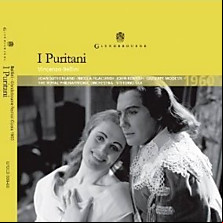BBC Review 1bj6o
A fitting tribute to the phenomenal career of Joan Sutherland.
Graham Rogers 2010
By a remarkably prescient stroke of good timing, Glyndebourne released this first-time-on-disc live performance featuring the great Joan Sutherland in one of her signature roles within weeks of her death in October 2010. This 1960 of Bellini’s I Puritani thus becomes a fitting tribute to a phenomenal career. It captures Sutherland in sparkling form around the time she was on the verge of international stardom – and when her nickname La Stupenda was first coming into well-deserved common use.
Sutherland later recorded the role of Elvira twice in the studio, both justly famous s, but the freshness and spontaneity on display in her role debut at Glyndebourne make this uniquely special. She is in wonderful voice throughout: supreme breath control, matchlessly brilliant trill technique and gracefully fluent coloratura all seem astonishingly effortless. Even her diction, always (arguably) an Achilles heel, is fairly clear.
Sutherland’s great sense of drama masterfully conveys the inner turmoil of Elvira, daughter of a Puritan family, driven to madness by her love for Arturo, a Royalist. The climactic scene with Arturo, which takes up most of the final act, brims with vivid contrasts and a mesmerising range of emotion in which Sutherland bedazzles.
The rest of the cast (names that are largely unfamiliar to us today) are decent but far less remarkable. Tenor Nicola Filacuridi makes confident work of Arturo’s bravura, but he’s no Pavarotti (Sutherland’s peerless partner on the 1973 Decca recording). Filacuridi’s rather strident voice has nowhere near the beauty of tone that Sutherland displays and when, in the dénouement, events take an unexpected turn and all ends happily for the lovers, it inevitably feels a shame that the final aria of jubilation is assigned to Arturo rather than Elvira.
The mono recording has been very well restored, sounding relatively crisp and clear, and the live opera house atmosphere is very engaging (obtrusive stage clumping notwithstanding). Veteran Italian opera conductor Vittorio Gui helms an affectionate and pretty lively , but one that stops short of the ionate immediacy we have become accustomed to in more recent performances of this repertoire. This is a small quibble, however, and takes nothing away from the glorious singing of a legendary artist at its heart.



